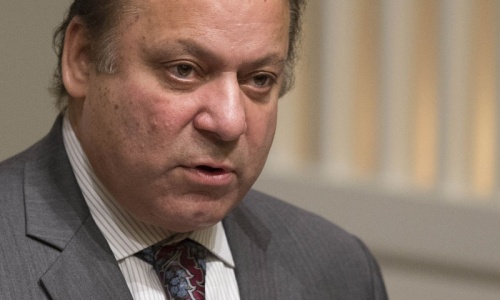COLOMBO: Sri Lankan President Mahinda Rajapaksa hit back angrily on Thursday against allegations of war crimes which are set to overshadow Commonwealth summit starting here on Friday, saying he had “nothing to hide” from his critics.
Mr Rajapaksa, who will chair the three-day summit, told reporters he was ready to confront the likes of British Prime Minister David Cameron but would not be lectured to.
The summit has already been dogged by boycotts, with the leaders of Canada, India and Mauritius all staying away over the bloody end in 2009 to one of Asia’s deadliest civil wars. Mr Rajapaksa has been under fire from rights groups and UN bodies for refusing to allow an independent investigation into the finale of the conflict, which pitted ethnic Tamils against the majority Sinhalese government.
“We are very open, we have nothing to hide,” the president told a press conference on the eve of the summit.
Mr Rajapaksa said he was ready to meet Mr Cameron to discuss allegations that up to 40,000 civilians were killed by Sri Lankan forces in the closing stages of the 37-year conflict in the island’s north.
“I will be meeting him and we will see what (happens), I will also have to ask some questions,” said the president, who visibly bristled and raised his voice as he took questions.
Mr Rajapaksa, president of the former British colony since 2005, mounted a stout defence of his administration’s handling of allegations of rights abuses.
“We have a legal system in Sri Lanka,” he said.
“We have a human rights commission, now the Commonwealth is ready to strengthen it. If there are any violations, we will take actions against anybody.”
The 67-year-old said his administration deserved credit for ending the conflict.
“People were getting killed for 30 years; at least after 2009 we have stopped it. There is no killing in Sri Lanka today.”
At least 100,000 people lost their lives in the conflict.
Government spokesman Keheliya Rambukwella told the BBC: “We are a sovereign nation. You think someone can just make a demand from Sri Lanka? We are not a colony. We are an independent state.”
As well as allegations against government forces, Tamil Tiger rebels — known for their trademark suicide bombings — are also accused of killing thousands of people.
Mr Cameron, who intends to travel to the war-torn northern Jaffna peninsula, has said he wants to have “tough conversations” with Mr Rajapaksa.
The British premier, who stopped off in India, reiterated calls for a “proper” investigation into the last stages of the war.
Mr Cameron, who has rejected calls to join the boycott, will be the first foreign leader to visit the north since Sri Lanka’s independence in 1948.
“There needs to be proper inquiries into what happened at the end of the war, there needs to be proper human rights [and] democracy for the Tamil minority,” he said in comments broadcast by India’s CNN-IBN network on Thursday.
“There’s always a case for not going somewhere but I think actually we will get further by going and having conversations with the Sri Lankans about what needs to happen and shining a light on some of the issues and problems that are there.”
Ahead of Mr Cameron’s arrival, his Foreign Secretary William Hague met leaders of the main Tamil opposition party, the Tamil National Alliance, who won a large majority in recent provincial elections in Jaffna.
Critics say the polls did little to address Tamil demands for more autonomy and Mr Hague urged “both the government and the TNA to work constructively together towards a political settlement that delivers meaningful devolution”.
Kamalesh Sharma, the Commonwealth’s Secretary-General, denied the organisation had turned a blind eye to allegations against the summit hosts. Asked whether Sri Lanka’s rights record made a mockery of the Commonwealth, the former Indian diplomat said the organisation had made progress by engaging with Mr Rajapaksa’s regime.
“It (the alleged rights abuse) is not making a mockery. It is showing the Commonwealth in action,” he told reporters.
At the last summit in 2011 in Perth, Commonwealth leaders drew up a charter of common values which committed members to respecting human rights.
Rights groups said the relevance of the organisation was now on the line.
“The Commonwealth risks its credibility as an international forum if it doesn’t publicly press Sri Lanka on its rights record and the lack of accountability for wartime atrocities,” said Brad Adams, Human Rights Watch’s Asia director.
A report by Brussels-based think tank, the International Crisis Group, said Colombo’s “attempts to mask its growing authoritarianism...appear increasingly flimsy”, accusing it of undermining judicial independence after the impeachment of the chief justice earlier this year.
Despite the allegations of abuses against Tamil civilians, who account for some 12 per cent of the 20 million population, Mr Rajapaksa said he was determined to heal the island’s pain.
“My policy is to win over even the terrorists,” he said. “We are ready to talk to them, but we will not allow anyone to divide this country.”—Reuters/AFP















































